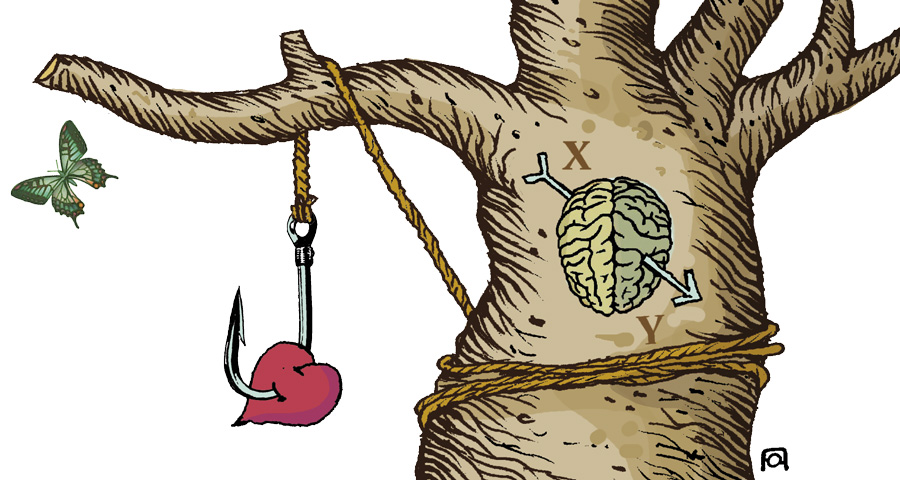

Gure barrenean tximeletek tarteka egiten duten hegaldi –denontzat ezagun– horri esan ohi diogu maitasuna. Gauetik goizera eder eta alai bilakatzen gaituen sentipen indartsu eta zirraragarri horixe, zer kontatuko dizuet, ez dakizuena. Baina konstrukto sozial bat ere bada, sortzetik beretik erraietan inokulatu egiten zaiguna, harremanei buruzko gure ikuspegia errotik baldintzatuz.
Horregatik, maitasunaren kontuez (maitatzea, harremanak, loturak, sexua, fideltasuna eta abar) gutariko bakoitzak egiten duen irudikapena ez da inoiz erabat partikularra, jendarte bateko kide garelako, eta mundu ikuskera kolektibo baten arabera dugulako beti gure errealitate–rik intimoen–a ere eraikitzen. Bai, maitasuna politikoa da. Munduaren alde honetan, patriarkala, heteronormatiboa, kapitalista eta kontsumista.
Oro har, maitasun erromantikoaren mitoak ekarririko uste ustelen arabera konfiguratzen dugu oraindik afektibotasunaren esparrua. Zoritxarrez, hertsiki arautzen du patroi zurrun horrek gure maitatzeko manera, bai eta goitik behera diseinatzen ere amodio-esperientziaren gure bizipena. Zein den harreman batean eduki beharreko espektatiba; erlazio batean eman beharreko pausoen segida; onartu edo gaitzetsi beharreko jokamoldeen zerrenda; generoaren arabera egin beharreko rolen banaketa; edo zenbatekoa den aldi berean maitatu daitezkeen pertsonen kopurua.
Ez dut maitasun erromantikoaren deskribapen zehatza egitearen lana hartuko, aski txertatua dugulako iruditeria kolektiboan printze eta printzesen arteko amodio idilikoen narratiba. Esan dezadan, besterik gabe, laranja erdia topatzearen zori on edo txarraren esku uzten duela gure ongizatearen patua, bakoitzak bere errealitatea eraldatzeko duen indarra desaktibatuz, edo nork bere bizitzaren gaineko ardura anulatuz. Bikote batekiko harremana ezartzen du unibertso afektiboaren ardatz bakar, eta bigarren mailakotzat jotzen ditu lagun edo familiakoekiko loturak, maitasuna hartu eta emateko dauden bestelako sareak nolabait gutxietsiz.
Hainbeste zedarritutako eremuan ez dago maitasunarendako toki handirik. Izan ere, halabeharrez behar du amodioak libre, emozio eta sentimenduz dagoelako mamitua, eta hauek ezin direlako, ez gehiegi arautu, ez epe luzera hitzeman ere. Maitasun librea-ren kontzepzioari ezin zaio, beraz, objekziorik jarri, baina komeni da kontzeptua ongi defini dezagun, askatasunarekin dugun harremana hain disfuntzionala izanik, ez dagozkion ezaugarriak atxiki ohi baitizkiogu maiz libre kualitateari.
Maitasun librea ez da jende gehiagorekin oheratze hutsa, afektuen metaketa deshumanizatua, edo maitasun kontsumo konpultsiboa. Libreago eginen gaituena ez baita amorante-kantitatea, harreman kualitatiboki ezberdinak eraikitzen jakitea baizik. Nahi dugunekin, nahi dugun gisan, eta nahi dugun bitartean. Baina nor bere buruaren eta amorante–ar–en beharren jakitun izanik, eta elkarren zaintza eta begirunea ezarriz jendeekiko erlazio guzien oinarrian.
Horrek, noski, ardura afektiboaren kontzientzia garbia galdegiten du. Edo gauza bera dena, gure askatasun indibiduala heldutasunez kudeatzeko gaitasuna. Hau da: harreman baten aukera eta gogoa sortzen zaigunean, geure buruari galderak pausatzeko adorea izatea: benetan nahi dudan sartu, niretzat zentzua duen, sostengatzen ahalko dudan erlazioa, edo pertsona bati eman behar zaion zaintza eta tratua emateko moduan naizen. Paradigma aldatu nahi baldin badugu, eta gure bizitza sexu-afektiboa beste koordenada batzuen arabera gidatu, ez ahantz: Aske bizi, aske maitte. Ez dago katerik. Nahi dogunien, nahi dogulako.